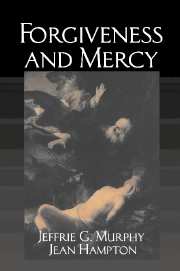2 - Forgiveness, resentment and hatred
Published online by Cambridge University Press: 14 January 2010
Summary
Sir Joshua told us a curious particular of Dr. Adam Smith. He had taken a resolution that he would hate nobody, and if he knew himself, there was nobody in the world whom he hated. This was a new thought to me for the moment, and I am afraid it is new to most people in actual practice. But it is an essential principle of Christianity. Let me try it. But it does not exclude a certain degree of aversion to some compared to others.
James Boswell, Journal, February 23, 1788We are constantly exhorted to forgive those who wrong us. However, in Chapter 1 Jeffrie Murphy is sympathetic to the Nietzschean thought that forgiveness may, at least in certain circumstances, be harmful and wrong, a vice rather than a virtue. Like Bishop Butler, Murphy understands forgiveness as the overcoming of resentment. But the failure to resent a moral injury need not be a good thing: “If I count morally as much as anyone else (as surely I do), a failure to resent moral injuries done to me is a failure to care about the moral value incarnate in my own person (that I am, in Kantian language, an end in myself) and thus a failure to care about the very rules of morality.”
Information
- Type
- Chapter
- Information
- Forgiveness and Mercy , pp. 35 - 87Publisher: Cambridge University PressPrint publication year: 1988
Accessibility standard: Unknown
Why this information is here
This section outlines the accessibility features of this content - including support for screen readers, full keyboard navigation and high-contrast display options. This may not be relevant for you.Accessibility Information
- 57
- Cited by
